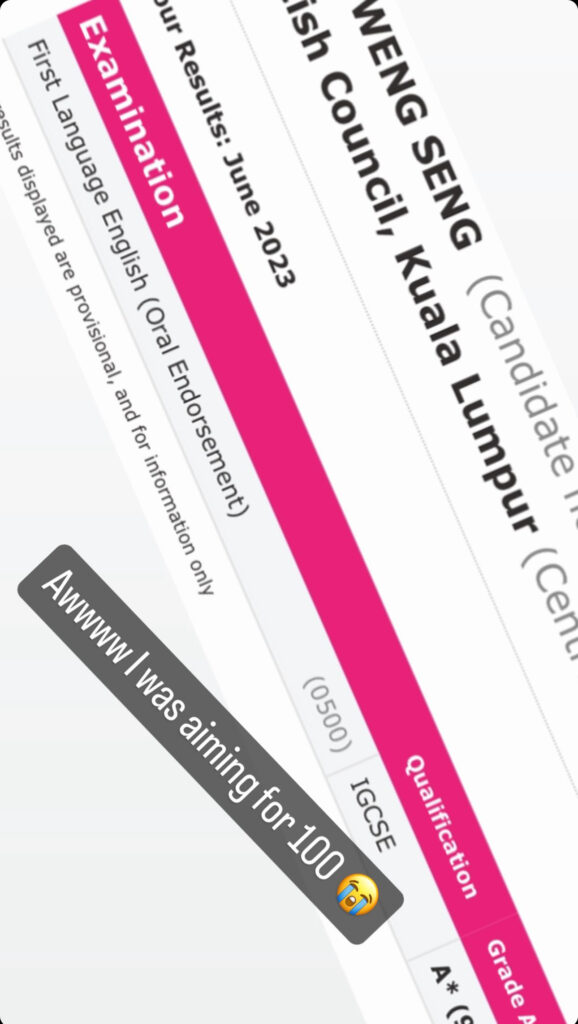You there. Yes, you. There’s only you at the moment. Who else could I possibly be talking to? I know what you’re doing. You’re trying to read this because you think that somehow or another, that these words will serve as a panacea for you.
You believe that they will liberate you from semesters of poor grades and you imagine somehow that they will serve you by bringing you an emancipation which you never imagined that you would receive. Well, in the particular context of this website, I suppose that that emancipation is getting the A-star that you otherwise would never have received if you had not found it. Well, I’m here to tell you an unfortunate fact. It will not do that.
I’m here to tell you an unfortunate truth. That whatever tricks, techniques, or modes of mastery that you think that this website will bring you, they will never be more important than a singular factor that will determine almost the entire share of the skill that you ever procure in the English language:
How much you genuinely enjoy learning it and integrate it into your life on a day-to-day basis.
I am sorry to tell you this, but in order for you to get good at English, you will probably have to like it.
There is no other way around it.
You may rejoin by saying that discipline is the answer to this conundrum, and that one need not necessarily like something in order to become good at it. Well, to that I say, it would be a miracle if your motivation could last, but even if it does, I imagine that it would be unfortunate if all that persisted was your habit and the way that it mechanically propels you forward towards a mastery that you have no passion for and frankly speaking, are extremely unlikely to persist… For you are not a machine – you are a human being with preferences, desires, and wants.
Therefore, I would encourage you to seek out the wondrous vistas of the English language and the joys that it shall confer upon you if only you can appreciate it from somewhere deep within your spirit.
To become good at English, you need to want to get better and act upon it, not by forcing yourself, but rather by your intuition and a desire from within.
If you do not like it, you will continue to see websites like the one that you are reading simply as a means to an end – a way of securing a grade that you otherwise may not have received.
You will see rules as confusing, complex, and difficult to understand – you will see each one as a challenge rather than an opportunity.
Perhaps you feel that this site is a place to unwind secrets that you think the author has written, but in reality, it contains only small guiding lights that you can take as if they were torches in the midst of a dungeon path; they will illuminate your path ahead and beyond, but they will not bring you forward step by step until you manage to conclude the journey, for that is something that you alone can do with your own strength.
Right now, I’d like you to take that idea and to extend it into understanding that indeed, your journey is indeed akin to walking a path.
The journey ahead of you is akin to walking along a path with its individual dangers, footholds, terrain, each of which are unique to the way that you process and understand the world at this particular stage, given your prior education, and also the things that you had learned before.
Suppose you take up a torch and look forward and ahead, considering what lies in front of you.
If you hold the torch in your hand alone, you shall never illuminate anything but what lies ahead when in reality, you must move forward actively, seeking mastery over a domain that you do not know.
If you remain stagnant and do not choose daily to move forward, then though you hold it in hand, you shall simply stand in a particular place, not moving forward when in reality, the path will not navigate itself; no tool is so enlightened that it will undertake the entirety of the project that it was designed for on behalf of its master.
Know that it is your task to take up that torch and move forward on your journey, illuminating all the different complexities of the path that lies ahead – one that is unique to each personality and altogether distinct, dependent upon the intricacies and the unique characteristics that it bears.
On your part, know that English language mastery is, at the end of it, a skill that is unique to yourself. As the reader, you shall only be able to access this world through your own mind, and as the reader, you shall only be able to improve your own English language mastery through your own volition and through the small and subtle decisions that you undertake on a day to day basis, the ramifications of which will extend far beyond the immediate moment.
Therefore, ask yourself about what it is that you do every day to navigate the path.
Do you, in fact, look up English news, seek out English books, or follow English-speaking thought leaders to seek out the insights that they can convey?
Or do you simply think of English as something to fear, a foreign concept altogether divorced from your day to day communication, and simply something that you must pick up as a means to an end?
While I cannot judge any person based on their preference or what it is that they wish for, I would argue that if your reasons for wishing to get better at the English language fall in the latter bucket, then your long-term prospects for mastery in the language are not wonderful; you will find it difficult to navigate forward, as the path is fraught with many different challenges embodied by the small misunderstandings and the issues that currently assail you. Unique to yourself as you move along it with your torch, which will not stand the test of time if you do not continually and assiduously give it energy or use it to illuminate the journey.
Therefore, as you go forward on your journey, make sure to find different ways in which you enjoy the English language.
Whether the barriers you presently face are a matter of personal resistance that may be a result of past failures or negative experiences with the English language, I’d like to encourage you to overcome this fear for the simple reason that who you are now is not who you will be in the future; people can change, and so can you.
The question is, do you believe in that possibility of change?
If you don’t, then I would say that you are wasting your time by simply reading these words as they stream along the page, offering you only intimations of a light that you will not seize, a torch that you will not grasp.
Choose light. Choose growth. Choose to believe in yourself, and gather the courage to take up the torch in your hands – Once you succeed in doing so, the rest becomes easier. What was once difficult will transform itself into a habit, and from habit into procedural and perhaps slow growth. But it will be growth nonetheless.
Face your struggles, your difficulties, the dark side of your past history of linguistic mastery, and look forward into the fascinating world of the English language as you consider the ways in which it can broaden your understanding and perspective, not just as you read this site, but also everything else in the world around you, in a world full of possibilities beyond just corporate and financial gain, but also in cultures and worlds that you may never have experienced but that unites in the usage of this lingua franca which you are accessing this page in as you look beyond your daily conversation and the world and mind that you have become accustomed to into a brand new era that is fraught with possibility.
Will you take up that torch? Will you find those reasons from somewhere deep within your soul?
Will you walk forward one step at a time with an honest view of where you lack, committing yourself to become better with each passing moment as you build your skills and strength in this language?
If you have read up until this point already, then I suppose that you already know the answer.
Thank you for investing in yourself.
Thank you for reading this, and I hope the very best for your growth as a learner, and as a thinker.
With my very best, Victor.





